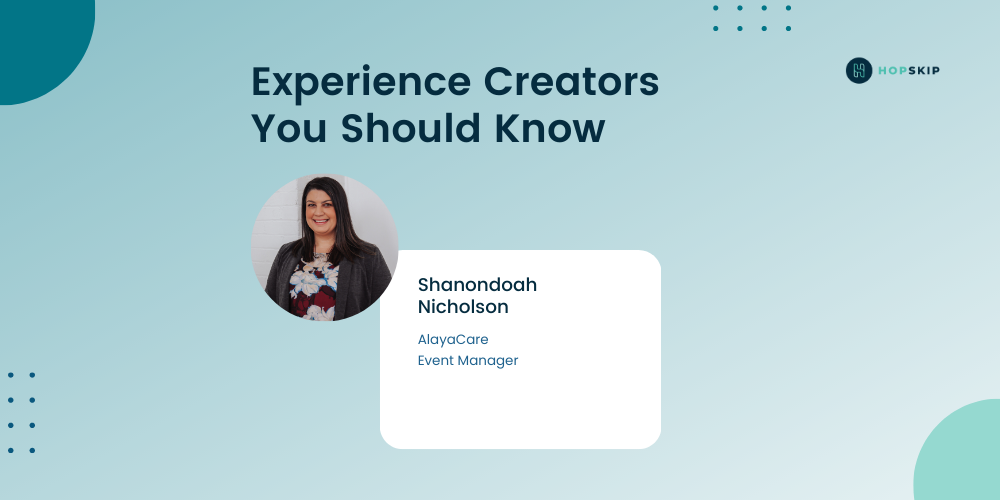Experience Creators You Should Know - Shanondoah Nicholson, AlayaCare
Shanondoah Nicholson, of AlayaCare, discusses how she honed her skills over the pandemic to now be in position to overcome the challenges that the new meetings/events landscape brings.
Luke Whalin
Mar 29, 2023

This post is part of the HopSkip Planner Spotlight Series where HopSkip spotlights planners across the industry to bring awareness of how they adapted to COVID-19, communicating and lessons learned and sharing how they are viewing the meetings and events industry in a post-pandemic world.
Name: Shanondoah Nicholson
Company Name: AlayCare
Job Title: Event Manager
Years of Experience: 13
How did you get your start in the events industry? What made you pursue this role?
I started as an administrative assistant for a sales team at a technology company. I started on a contract and ended up staying for 4 years. I was always interested in events and found corporate events through my work as an admin. While I was in that role, I went back to school for marketing and events which eventually led me to where I am today.
How would you describe your role or responsibilities as a professional event planner?
I am responsible for crafting an experience for an attendee that supports the goal of the event.
How do you compare planning your first in-person event post-pandemic, to planning meetings/events pre- Covid? What was different and unique? What was similar?
What challenges have you faced in your work as a meeting and event planner, when working with suppliers or sourcing a venue and how did you overcome them?
What struck me the most was how much hadn't changed, despite the disruption. People were eager to get together in-person and connect, out from behind their computer screens. Following the lockdowns, it is really important to ensure your event has a clear purpose for attendees. Many people are still working remotely and without showing them real value, they aren't going to make the effort to attend your event.
Every planner has likely experienced the champagne expectations on a beer budget. Setting realistic expectations with all stakeholders is key to ensuring a successful event. Working with vendors who aren't aligned with the purpose of your event can create challenges, if they don't truly understand your program, you will have a heavier lift in pulling it off.
How do you determine which vendors are best suited for your stakeholder's needs while also finding those providing competitive services at affordable rates?
Connecting with vendors and ensuring they really understand the purpose of the event and the audience ensures that we're aligned. Sometimes the most expensive venue is what's needed for a group, and sometimes it isn't. Being as clear about your demographic, and their expectations, as well as yours, ensures you're on the same page.
Are there any key lessons or insights that have shaped your approach to event planning over the years?
Getting really clear about the purpose of the event will help you when you're working with stakeholders. As event planners, we have to satisfy the needs and wants of our internal and external stakeholders, ensuring that you're clear on your purpose will allow you to fall back on it when there's disagreement. If it doesn't serve the purpose of the event, it probably doesn't belong.
Having all your ducks in a row as early in the conversation can be really helpful so you can ensure you're getting proposals back from the right vendors. Also, if you've run this event in the past, be sure to communicate what worked and didn't work for your group so it's addressed early on and there are no surprises throughout the process.
What is the biggest area of improvement that you think hotels can make when either responding to your RFPs or during the contract phase of your event?
Due to the pandemic, our events community had to evolve, adapt, and grow. Many planners started to embrace new technologies as a result of the pandemic. What new tech are you using today in your planning process as a result?
Since education and relationships are two major pillars in the meetings and events industry, any suggestions on how other planners can learn and network with their peers across the industry?
Proving planners with as much detail as possible. With technology at our finger tips, we shouldn't need to go back and forth on the layout of the rooms, or photos. Having that information immediately will save us so much time going back and forth.
Working with tools that automate tasks so there's less back and forth when it's time for the next person to take over. Also, shared documents, coming from a world where only one person could be in a document at a time, proper document sharing is so important.
Using social media is a great way to find and connect with planners and vendors, especially over LinkedIn or Instagram. There are also a number of podcasts that can help you find industry stars, many of whom love chatting and connecting with others about the events industry.